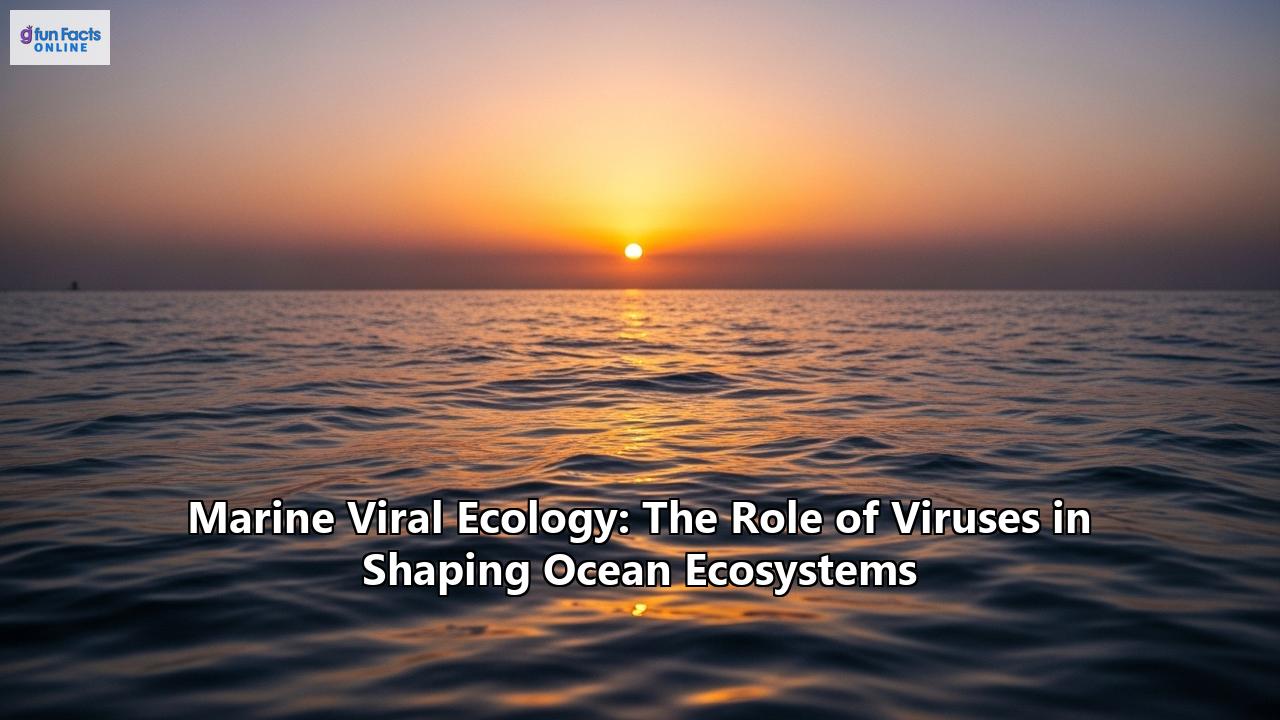The Unseen Puppeteers of the Ocean: How Viruses Shape Marine Ecosystems
In the vast, sunlit expanses and the crushing, dark depths of our planet's oceans, an invisible drama of life and death unfolds on a staggering scale. The protagonists of this epic are not the whales or the sharks, but the most abundant biological entities in the sea: viruses. For decades, these microscopic entities were largely overlooked, but a revolution in scientific understanding has revealed them as powerful puppeteers, pulling the strings of marine ecosystems and influencing the very climate of our world.
A World Teeming with Viruses
It's a mind-boggling concept, but every teaspoon of seawater contains roughly a million viruses. This makes them the most numerous life forms in the ocean, outnumbering bacteria by a significant margin. These are not the viruses that cause the common cold; the vast majority are bacteriophages, or phages, which are specialized to infect and replicate within bacteria and other single-celled organisms that form the base of the marine food web. This staggering abundance and diversity are central to their profound ecological role.
The "Viral Shunt": A Fundamental Force in the Ocean
One of the most significant discoveries in marine virology is the process known as the "viral shunt". When a virus infects a microbe, it essentially hijacks the host's cellular machinery to create copies of itself. This process often culminates in the host cell bursting open, an event called lysis.
This lysis has a cascade of effects. Instead of the microbe being consumed by a larger organism and its nutrients moving up the food chain, the viral shunt redirects this organic matter. The lysed cell releases its contents—carbon, nitrogen, phosphorus, and other essential nutrients—back into the surrounding water. This dissolved organic matter then becomes a feast for other microbes, effectively short-circuiting the traditional food web and keeping nutrients in the microbial loop. It is estimated that viruses are responsible for the daily release of a massive amount of carbon through this process, playing a vital role in the global carbon cycle.
Regulators of Marine Life and Death
Beyond nutrient cycling, viruses are key regulators of microbial populations. By infecting and killing specific types of bacteria and algae, they prevent any single species from becoming too dominant, thereby maintaining biodiversity. This is particularly crucial in the context of harmful algal blooms. These blooms, which can produce toxins that harm marine life and humans, are often brought to an end by viral infections that spread rapidly through the dense population of algae. In this sense, viruses act as a natural control mechanism, helping to restore balance to the ecosystem.
Viruses are also powerful drivers of evolution. Through a process called horizontal gene transfer, viruses can carry genes from one host to another. This exchange of genetic material can introduce new traits and capabilities to microbial populations, accelerating their adaptation to changing environmental conditions.
The Cutting Edge of Marine Virology: New Discoveries and Technologies
Our understanding of marine viral ecology is undergoing a rapid transformation, thanks to cutting-edge technologies. The advent of metagenomics, the study of genetic material recovered directly from environmental samples, has been particularly revolutionary. It has allowed scientists to bypass the need to culture viruses in the lab, which is notoriously difficult, and instead to sequence the genomes of entire viral communities directly from seawater.
This has led to an explosion in the discovery of new viruses. For instance, recent studies have unveiled a vast diversity of previously unknown "giant viruses". These viruses, which can be larger than some bacteria, possess complex genomes that include genes for processes once thought to be exclusive to cellular life, such as photosynthesis and metabolism. This suggests that these viruses may actively manipulate their hosts' metabolic processes to their own advantage.
Furthermore, the integration of viral data into sophisticated ecological models is a burgeoning area of research. By understanding the intricate interactions between viruses and their hosts, scientists hope to better predict how marine ecosystems will respond to environmental changes, including climate change.
Marine Viruses and a Changing Climate
The role of marine viruses is becoming increasingly critical in the context of climate change. As the oceans warm and become more acidic, the dynamics of virus-host interactions are also likely to shift. Research is underway to understand how these changes will affect viral activity and, consequently, the ocean's ability to absorb atmospheric carbon dioxide.
Interestingly, scientists are also exploring the potential for marine viruses to be part of the solution to climate change. By identifying viruses that infect microbes involved in carbon processing, researchers are investigating whether these viruses could be used to "dial up" the ocean's capacity to sequester carbon. The idea is to encourage the growth of microbial aggregates that are heavy enough to sink to the deep ocean, effectively locking away carbon for long periods.
The Future of Marine Viral Ecology
The field of marine viral ecology is brimming with exciting possibilities. Future research will undoubtedly focus on unraveling the functions of the vast "dark matter" of unknown viral genes and exploring the complex interplay between viruses, their hosts, and the environment. The development of new technologies, such as single-cell genomics and advanced imaging techniques, will provide unprecedented insights into the life of a single virus and its impact on its host.
From their fundamental role in nutrient cycling to their potential application in mitigating climate change, marine viruses are a testament to the profound impact of the microscopic world on a global scale. As we continue to explore the ocean's depths, we are only just beginning to appreciate the full extent of the influence wielded by these unseen puppeteers. The secrets they hold are sure to reshape our understanding of marine ecosystems and the future of our planet.
Reference:
- https://news.wfu.edu/2022/11/21/how-marine-viruses-could-impact-climate-change/
- https://www.frontiersin.org/journals/marine-science/articles/10.3389/fmars.2023.1303676/full
- https://www.numberanalytics.com/blog/hidden-world-marine-viruses
- https://pubmed.ncbi.nlm.nih.gov/29908587/
- https://www.researchgate.net/publication/271708735_Rising_to_the_challenge_Accelerated_pace_of_discovery_transforms_marine_virology
- https://euromarinenetwork.eu/activities/revealing/
- https://niof-eg.researchcommons.org/blue-economy/vol3/iss1/2/
- https://niof-eg.researchcommons.org/cgi/viewcontent.cgi?article=1037&context=blue-economy
- https://news.osu.edu/viruses-that-can-help-dial-up-carbon-capture-in-the-sea/

